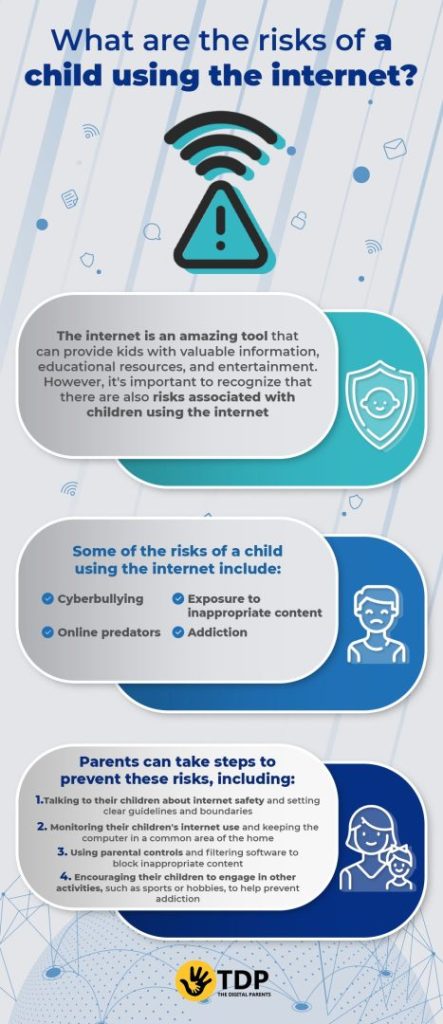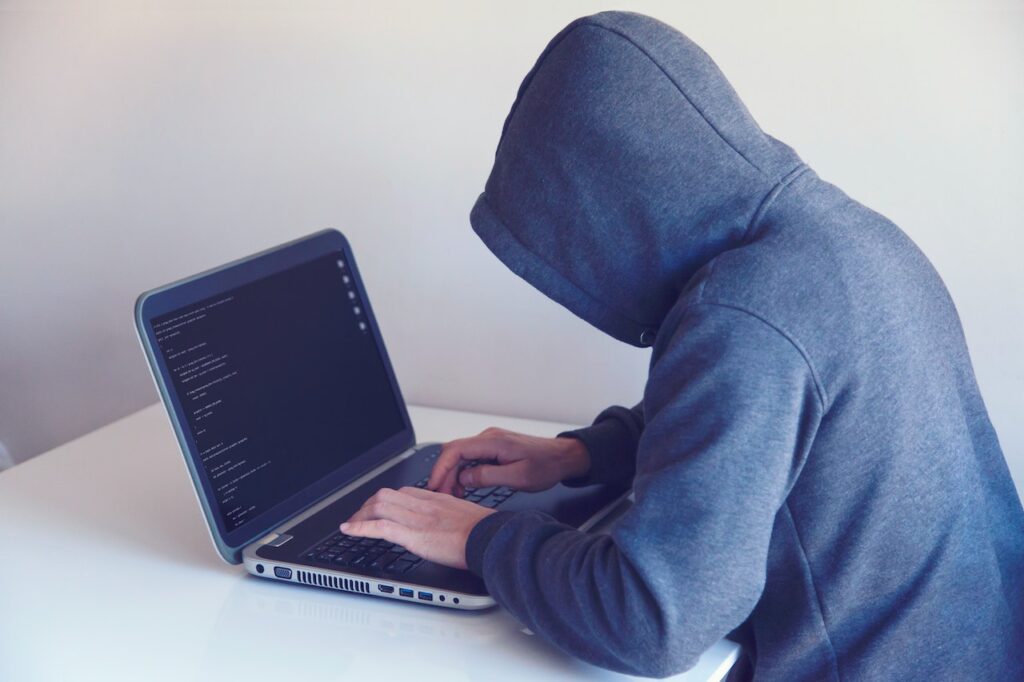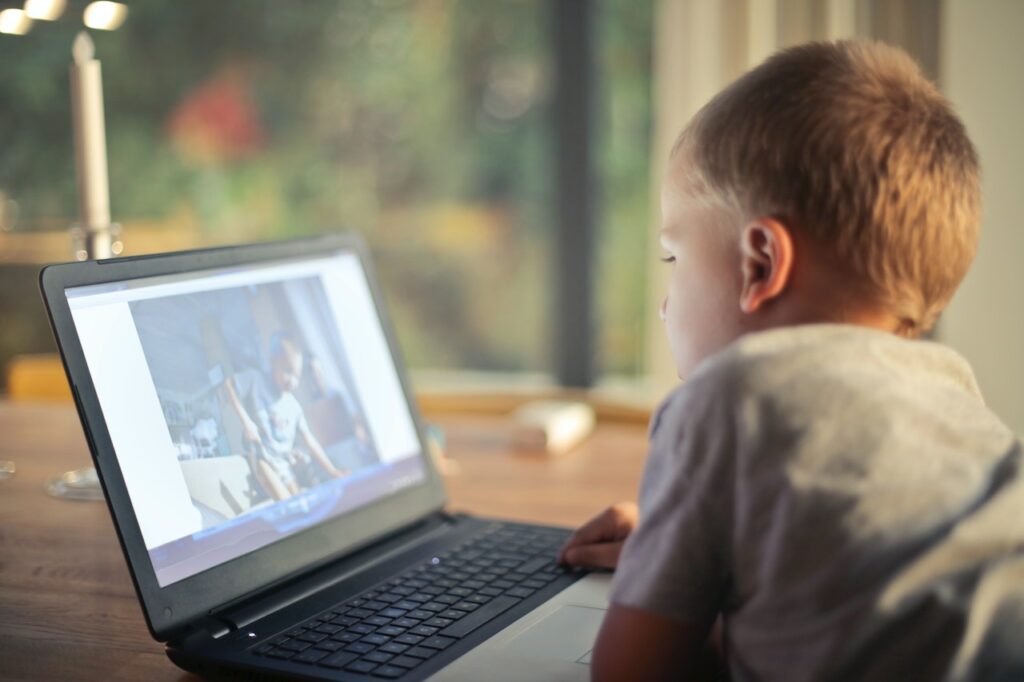Now, more than ever, we, parents struggle to inform, educate, monitor, and control our kids’ tech usage. The Internet is the virtual gathering spot where our little ones meet different people. But are they safe using the internet?
Parents often say they are aware of the potential risks of a child using the Internet. But is that true? Do we intervene when we should?
Some research says that 95% of children under the age of 18 use the Internet. So it is more than a worrying situation for us parents to alarm our kids about the risk of Internet usage.
Common Online Threats for Children

In the following paragraphs, we’ll go over the biggest online threats for children. This includes cyberbullying, inappropriate content, online predators, etc.
Cyberbullying
Cyberbullying means that our children are exposed to harmful content from other users online. Studies by Pew Research stated that about 46% of US teens have been cyberbullied in some form.
Our kids can often come across cyberbullying on the net because of the widespread usage of social media platforms, online forums, chat rooms, and video games.
For example, a group of school girls is preparing for PE class. One of the girls (jealous and mean) takes an embarrassing photo of another girl without telling her and posts it on every social media platform. The girls whose picture was shared gets exposed to hateful comments online.
Cyberbullying can cause serious complications in kids’ mental health. That includes low self-esteem, isolation, shame, blame, stress, anxiety, nervousness, aggression, fear, and depression.
Inappropriate Content

Inappropriate content includes images, videos, or posts online that can be aggressive, upsetting, disturbing, improper, or offensive. Shortly, inappropriate content is all those gross things you don’t want your children to watch. Kids may come across several types of inappropriate content online, such as:
- Violence and aggression;
- Hate, racism, and terrorism;
- Content that promotes dangerous lifestyles and even suicidal behavior;
- Vulgar and offensive vocabulary;
- Nudity and pornography;
If children run into inappropriate content on the Internet, they might develop strange emotions such as confusion, shame, and blame. Also, some inappropriate content promotes aggression and violence in children.
So children can develop two contrary personality sides, one that still supports their moral and ethical knowledge and they reject the content, and the other side that accepts the content, approves it, and children imitate the seen content.
Online Predators

Online Predators are Internet users that attack kids and teens to satisfy their abusive and exploitative behavior and purposes. Their behavior is abnormal and harms kids’ mental and physical health.
Often online predators stalk our kids on the net and start with a polite, friendly discussion to gain kids’ trust and learn information.
Once the kid has an open conversation with the predator by sharing private and family information, pictures, and videos, it becomes a victim of that dangerous behavior. Studies show that the number of online predators can be as high as 500.000! Consequences of kids’ interaction with online predators on the Internet include:
- It threatens personal life as a result of sharing their private information, addresses, phone number, passwords, and family members’ information;
- It threatens their mental health and damages their life because of the depression, fear, anxiety, nervousness, and frustration of becoming victims;
Most children that encounter online predators need therapy treatment.
Privacy Concerns
We, parents, shouldn’t allow our kids to suffer from these internet risks. Instead, we should focus on educating our kids about the importance of online privacy. We can start with teaching children about not sharing personal, private information and passwords on the net.
Our little ones are smart, and they can accept our guiding and protective intentions (although children often don’t listen to us, we still must try). We should point out the risks of Internet usage that are mentioned above and tell our children that keeping information safe on the Internet is the best way to avoid these risks.
How to Protect Your Child

Protecting our kids is our main parenting role. By providing open conversation with our kids’ we can set guidelines on how to stay safe online. You can follow the next few tips about how to protect your child from risks on the Internet:
- Kids need to understand the value of their personal information and never share it with strangers on the net or offline as well;
- Setting rules about limiting screen time and using tech mostly for education;
- Build trust between you and your kids with honest communication about the apps, websites, and contents kids use on the net;
- Kids need to recognize, report, and block inappropriate content or behavior;
- Kids should keep profiles private and always think twice before deciding to post something;
- Monitor your kids’ activities and set parental control apps;
- Make a habit of using complex passwords and rechange them often;
- Check your kids’ online profiles they use on the net and get informed about their online friends;
Our kids’ internet safety is not a choice we make it is a thing we must keep in mind.
Conclusion
To keep our little ones safe on the net means protecting them from all of the risks that exist on the Internet and are a real threat to our kids’ health. Cyberbullies, online predators, and inappropriate content are existing risks on the Internet with their only goal to harm our little ones well being.
Education, monitoring, and constant open communication with our cutie pies will develop a positive mindset about staying safe online and keeping personal information private. Protective parents raise protected kids (but don’t go too far).
FAQ
At what age should kids use the internet?
It all depends on the responsibility, personality, and maturity of the kids’ age and parents’ opinion about Internet use. For example, school kids the age of 10 and above can use the Internet both for education and relaxation, but younger ones should avoid the Internet without parental help.
How do children misuse the Internet?
Kids misuse the Internet if they willingly expose themselves to inappropriate content and harm others online.
What is digital law for kids?
Digital laws for kids are digital Rights & Responsibilities for using the Internet appropriately and respectably, teaching children to be good digital citizens.
What is Internet etiquette for kids?
Internet etiquette for kids includes rules about how children should be responsible and positive online. Some basic Internet etiquette is awareness of how they treat other people and how they want to be treated, thinking twice before posting, never using inappropriate vocabulary, and never accepting inappropriate content or behavior.







